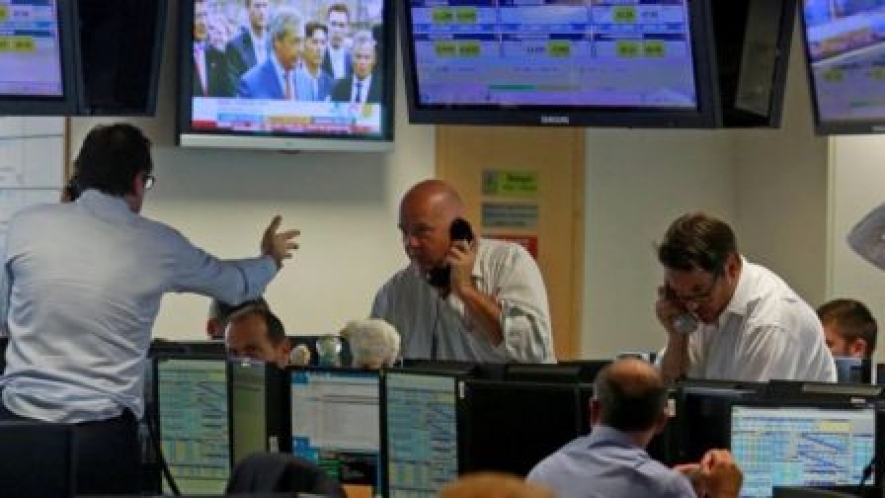The FTSE 100 index opened down 0.8% at 6,092.19 points.
The index had plunged more than 8% at one point on Friday before recovering some ground to close 3.2% lower.
Sterling was trading at $1.3463, down more than 2% from Friday's close. Against the euro it was trading at €1.2170, down 1.2%.
On Friday the pound had its biggest one-day fall against the dollar, at one stage sinking as low as $1.3236.
In a statement issued before the UK stock market opened, Chancellor George Osborne said the UK was ready to face the future "from a position of strength".
He also indicated there would be no immediate emergency Budget. Mr Osborne said there would still need to be an "adjustment" in the UK economy, but added it was "perfectly sensible to wait for a new prime minister" before taking any such action.
Yen worries
Authorities in Asia have been taking action to stabilise financial markets.
After an emergency meeting, Japan's finance minister Taro Aso said that he had been instructed by Prime Minister Shinzo Abe to take steps to stabilise the currency markets if needed. "Risks and uncertainty remain in financial markets," Mr Abe said.
The rising value of the yen is a concern to the Japanese government, as it makes the nation's exports less competitive.
After plunging almost 8% on Friday, Japan's benchmark share index, the Nikkei 225, added 1.7% on Monday.
In China the central bank weakened the official value of the yuan by 0.9%, the biggest move for the currency since August of last year.
'Under control'
On Sunday night Christine Lagarde, head of the International Monetary Fund, said that the UK's vote to leave the European Union had caught the financial markets by surprise.
But despite that, there had been "no panic" and the markets were "under control".
Tohru Sasaki, head of Japan market research at JPMorgan Chase in Tokyo, said falls in European markets would "not cause a financial crisis with the magnitude of the Lehman shock in 2008".
Stock markets plunged on Friday, with more than $2tn (£1.5tn) wiped off the value of global stock markets, according to Standard and Poor's Dow Jones Indices.
That was the biggest one-day loss in market value - even greater than the value wiped out following the collapse of Lehman Brothers during the 2008 financial crisis, Standard and Poor's calculated.
Next pressures
Traders will be watching the UK's financial position closely over the coming months.
Jeremy Cook, chief economist at World First, said: "We are still looking for another 10% fall for the pound against the dollar in the coming months as data confirms the economic slowdown and monetary policy expectations increase.
"The funding position of the UK, with its twin current account and fiscal deficits, are the next pressures to weigh."
The UK's current account deficit measures the balance of trade, investment income and money transfers.
That deficit means that the UK must borrow to pay its way in the world.
The fiscal deficit refers to the gap between government expenditure and income that has to be financed by borrowing. (BBC)




















